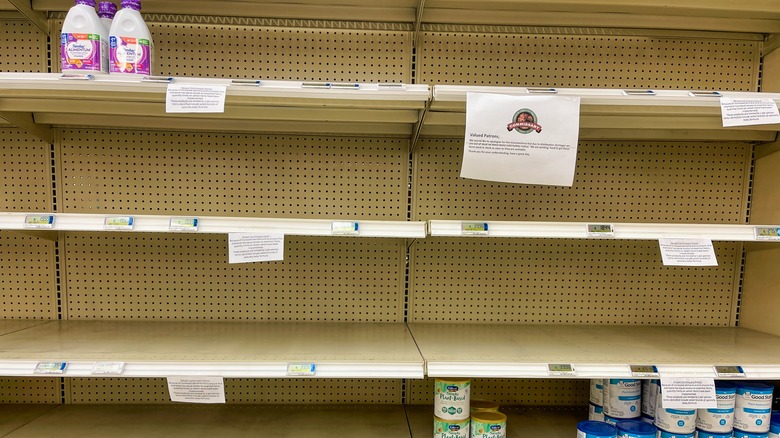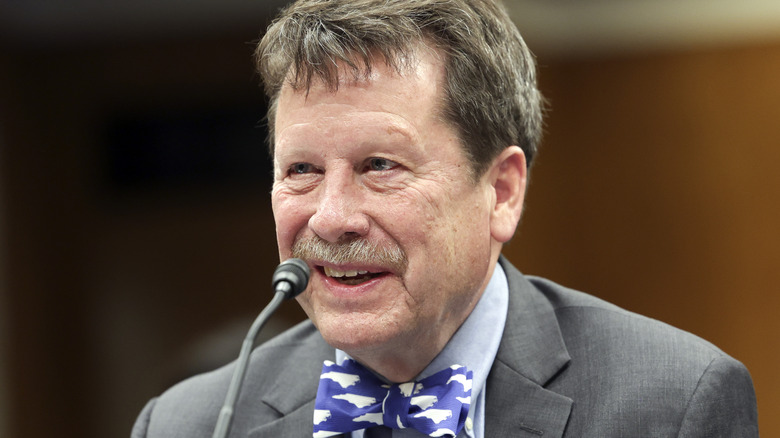Why The FDA Is Considering An Overhaul Of Its Food Program
What do you know about the U.S. Food & Drug Administration (FDA)? Many of us are probably most familiar with the agency by means of its periodic announcements of food recalls — most recently, for example, a recall of freeze dried blueberries that contained traces of lead — that serve to protect the public from contaminated or otherwise unsafe food. According to the agency's website, it's also responsible for making sure that foods are accurately labeled, an idea some of us might be aware of due to the recent controversy surrounding plant-based "milks" and whether they can legally be labeled as such due to the fact that they contain no dairy. The FDA, in that case, is tasked with enforcing its standards for the labeling of milk, which in the agency's definition is "the lacteal secretion, practically free from colostrum, obtained by the complete milking of one or more healthy cows."
But, as you might imagine is the case with a sprawling governmental agency, the FDA is responsible for many, many more areas of human health, including its whole arm dedicated to the safety of pharmaceutical drugs and medical devices (via FDA). And according to a statement released by FDA commissioner Robert Califf yesterday, the FDA has been spread extra thin as of late, with serious crises such as a contaminated baby formula scandal rocking the agency and causing it to reconsider how it will move forward with the food wing of its many legislative responsibilities.
A recall of tainted baby formula stressed an already-weakened agency
In a statement published on the FDA website, commissioner Robert Califf wrote that the agency has been facing numerous challenges related to the COVID-19 pandemic and beyond, and that it will launch an investigation into its Human Foods Program to determine whether a structural reorganization could help refocus and strengthen the FDA's ability to safeguard the American food supply.
Califf, who previously served as FDA commissioner in 2016 and 2017, rejoined the agency in February of this year to help shepherd the struggling agency through the massive scandal of Cronobacter and Salmonella-tainted FDA-approved baby formulas manufactured at Abbott Nutrition in Michigan. The recalled formula, which killed two infants and caused serious illness in two (via CDC), led to a severe nationwide shortage of formula that continues to this day (via Bloomberg). The cascade of events seriously damaged the agency's already-struggling reputation, according to Food Dive, leading Califf to announce possible changes to its structure in yesterday's statement.
"The agency has confronted a series of challenges that have tested our regulatory frameworks and stressed the agency's operations, prompting me to take a closer look at how we do business," Califf wrote.
The FDA will launch an independent investigation of its Human Foods Program
FDA commissioner Robert Califf shared that the agency's stressed Human Foods Program will be independently reviewed by The Reagan-Udall Foundation, which will ask "fundamental questions about the structure, function, funding, and leadership" and also evaluate the FDA's inspectional activities (via the FDA statement). The investigation's findings could help reshape an agency that, according to Food Dive, struggles with structural challenges — not least of which the fact that another government agency, the U.S. Department of Agriculture (USDA) also –confusingly — shares in regulating food safety.
Earlier this month, Democratic representatives Rosa DeLauro, the Chair of the House Appropriations Committee, and Dick Durbin, a senator from Illinois, introduced the Food Safety Administration Act on the Senate floor (via the U.S. House of Representatives). This proposal to establish a standalone Food Safety Administration — independent of the varied responsibilities and purviews of the existing FDA and USDA — is one possible result of the review of the FDA.
"Food safety is currently a second-class citizen at the Food and Drug Administration," DeLauro stated. "There are no food policy experts in charge of food safety at the FDA," which "contributes to a string of product contaminations and subsequent recalls that disrupt the supply chain, contribute to rising prices, and in many cases, result in consumer illness and death. Look no further than the recent infant formula crisis to understand the need to create a single food safety agency, led by a food policy expert."


